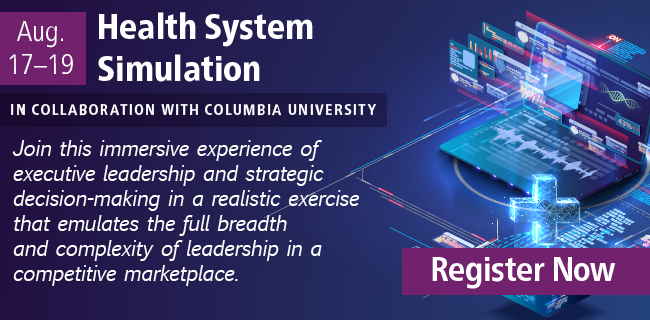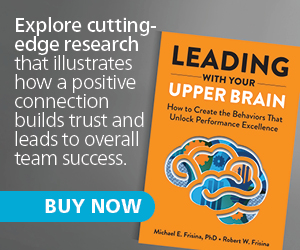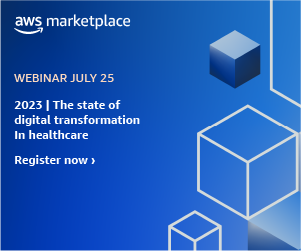
- Leadership Spotlight:
Making Progress on Health Equity, One Community at a Time - ACHE Seeks Nominations for Its Highest Honor
- 2022–2023 Annual Report: Leaders With a Purpose
- Summer Reading Is Sweeter With a Sale
- It’s Time to Recertify Your FACHE®
- AI, Ethics and Interconnected Healthcare Ecosystems
Leadership Spotlight:
Making Progress on Health Equity, One Community at a Time
People living in rural areas of the United States face some of the greatest barriers to accessing care, are the least likely to be able to get same-day or after-hours care, and have the highest rates of avoidable ER visits, according to a new analysis of 11 high-income countries. The study, which was published July 7 in JAMA Network Open and supported by the Commonwealth Fund, used self-reported data from some 22,000 adults to examine disparities in health status and socioeconomic risk, healthcare affordability and access to care. The United States was found to have significant urban-rural disparities on five health system indicators—the most of any country.
Social determinants of health, such as access to care, can lead to health inequities—disparate health outcomes that negatively impact underserved populations and most often, people of color. Focusing on these social determinants within communities is essential to addressing health inequities, which are ultimately a result of a misalignment between investments in clinical care and social care, says Anita Chandra, vice president and director, RAND Social and Economic Well-Being, in a feature article in the July/August issue of Healthcare Executive.
As health equity requirements are being instituted by more regulators, including the Centers for Medicare & Medicaid Services, developing initiatives to reduce inequities is showing up on more and more leadership agendas. In this feature, healthcare leaders from across the country—including Boston, Chicago and rural New Mexico—share how they’re working to address inequities in the communities they serve.
The July/August Healthcare Executive is only available online. Visit HealthcareExecutive.org to read the full issue.
ACHE Seeks Nominations for Its Highest Honor
There’s still time to nominate deserving colleagues for our highest honor—the Gold Medal Award. Our Gold Medal Award is the most prestigious award we bestow on outstanding leaders who have made significant contributions to the healthcare profession. This award identifies Fellows who best exemplify leadership at the organizational, local, state/provincial and national levels, and who continually contribute to the improvement of the delivery of healthcare services and community health. We may issue up to two Gold Medal Awards each year: one to an outstanding executive in a healthcare delivery organization, and the second to an executive in a nondelivery healthcare organization, such as an alliance, an association, a university or a consulting firm. Nomination packets are due by Aug. 16.
Visit the News and Awards section of ache.org for full details on the nomination process, award criteria and past recipients. If you have questions, please contact Jennifer L. Connelly, FACHE, CAE, vice president, Volunteer Relations, Executive Office, at (312) 424-9320 or jconnelly@ache.org.
2022–2023 Annual Report: Leaders With a Purpose
The 2022–2023 Annual Report documents our progress together in the previous calendar year and reflects on how connecting to our purpose helped us make a profound impact on those we serve. Available now on ache.org, you can access the letter to members from ACHE leadership, Strategic Plan goal areas, selected financial data, Premier Corporate Partners, contributors to the Fund for Healthcare Leadership, committee rosters, recent ACHE award winners, chapter information, a directory of services and more.
Please take some time to explore the 2022–2023 Annual Report to learn more about last year’s achievements and what we hope to accomplish in the year ahead.
Summer Reading Is Sweeter With a Sale
Score summer reading deals during the Health Administration Press summer sale, now through Sept. 15. Order any book and receive a 20% discount off already reduced member prices using the promo code SUMMER23 at checkout. The discount applies to both member and nonmember prices, but it excludes any already discounted multibook sets or bundles, Futurescan 15-packs, and the Board of Governors Exam Study Set, Bundle and Flashcards. Order and save with these discounts by visiting ache.org/HAP or calling (800) 888-4741.
It’s Time to Recertify Your FACHE®
If you are an ACHE Fellow whose credentials are set to expire in 2023, it’s time to recertify. ACHE Fellows must recertify their FACHE every three years, and they can do so in three easy steps:
- Complete a minimum of 36 continuing education hours related to healthcare management or administration (12 hours must be ACHE Face-to-Face Education hours) or retake and pass the Board of Governors Exam. Earn ACHE Face-to-Face Education hours by attending the following events:
- Virtual Board of Governors Exam Review Course, July 25–Sept. 5 (Earn 14 ACHE Face-to-Face Education credits).
- New York City Cluster, Aug. 7–10 (Earn up to 24 ACHE Face-to-Face Education credits).
- Health System Simulation, Aug. 17–19 (Earn 21 ACHE Face-to-Face Education credits).
- Austin Cluster, Oct. 2–3 (Earn up to 12 ACHE Face-to-Face Education credits).
- Complete four volunteer activities, including two that are community/civic-related and two related to healthcare.
- Pay the $200 recertification fee when you submit your recertification application by the Dec. 31 deadline.
You can learn more about the recertification process by visiting ache.org/FACHE and selecting the Maintain/Recertify My FACHE button from the menu. You can also check your individual progress by using the FACHE Recertification Progress tool available on My ACHE.
Additionally, if you are over the age of 60 and will retire within the next five years, you may be eligible for a one-time-only, five-year recertification waiver. For more information, please contact Customer Service at (312) 424-9400 or contact@ache.org.
Current Fellows in good standing who are retired from healthcare management may transfer to Retired Status or Life Status. Learn more about the FACHE(R) and LFACHE designations here.
AI, Ethics and Interconnected Healthcare Ecosystems
“The genie is out of the bottle: artificial intelligence. Generative AI. ChatGPT. It’s all the buzz now. In healthcare IT, CIOs are being asked by leaders, physicians and staff: ‘Can we use ChatGPT?’ ‘Is ChatGPT safe … accurate … will it save me time?’” write Jeri Koester; Heather Nelson, CHCIO; and Lisa S. Stump, FASHP—Carol Emmott Fellows from 2017, 2020 and 2018, respectively—in a recent ACHE Blog post. “ChatGPT holds incredible promise to streamline work on harried clinicians, to enhance communication with patients and to drive efficiencies in many administrative functions. So, what is the role of the CIO when it comes to partnering with your organization to define the who, what, when, why and how of it all?”
In a new blog post, Koester, Nelson and Stump—all leaders in healthcare informatics—share their thoughts on the opportunities and risks posed by generative AI in healthcare. Visit ache.org/Blog to learn more.


